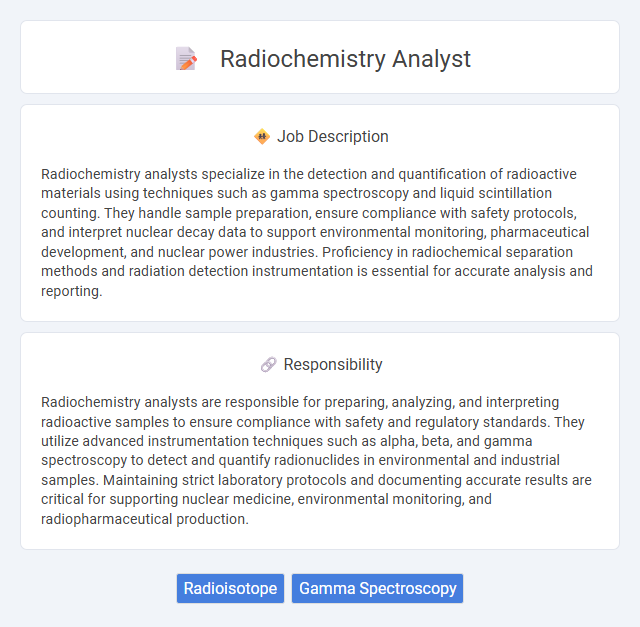
Radiochemistry analysts specialize in the detection and quantification of radioactive materials using techniques such as gamma spectroscopy and liquid scintillation counting. They handle sample preparation, ensure compliance with safety protocols, and interpret nuclear decay data to support environmental monitoring, pharmaceutical development, and nuclear power industries. Proficiency in radiochemical separation methods and radiation detection instrumentation is essential for accurate analysis and reporting.
Radiochemistry analyst roles may suit individuals with a strong attention to detail, patience, and comfort working with radioactive materials under strict safety protocols. Those prone to high stress or with sensitivities to radiation may find this environment challenging. People with analytical skills and the ability to follow precise procedures likely have a higher probability of thriving in this field.
Qualification
A Radiochemistry analyst requires a strong background in chemistry, typically holding a bachelor's or master's degree in radiochemistry, nuclear chemistry, or a related scientific field. Proficiency in handling radioactive materials, knowledge of radiation safety protocols, and experience with analytical instrumentation such as gamma spectrometers and liquid scintillation counters are essential qualifications. Advanced skills in data analysis, strict adherence to regulatory standards, and certification in radiation safety enhance the candidate's eligibility for specialized roles in pharmaceutical, environmental, or nuclear research laboratories.
Responsibility
Radiochemistry analysts are responsible for preparing, analyzing, and interpreting radioactive samples to ensure compliance with safety and regulatory standards. They utilize advanced instrumentation techniques such as alpha, beta, and gamma spectroscopy to detect and quantify radionuclides in environmental and industrial samples. Maintaining strict laboratory protocols and documenting accurate results are critical for supporting nuclear medicine, environmental monitoring, and radiopharmaceutical production.
Benefit
Radiochemistry analysts likely gain benefits such as exposure to cutting-edge nuclear science techniques and the opportunity to work in specialized laboratory environments. They probably enjoy competitive salaries and strong job security due to the specialized skills required in industries like nuclear energy and pharmaceuticals. Professional growth and contribution to safety and innovation within radiological fields could also be significant advantages.
Challenge
Radiochemistry analyst roles likely involve navigating complex challenges related to the precise measurement and analysis of radioactive substances. The position probably demands strict adherence to safety protocols while managing potentially hazardous materials, requiring meticulous attention to detail. Problem-solving skills are often critical as analysts may need to troubleshoot equipment issues or interpret ambiguous data to ensure accurate results.
Career Advancement
Radiochemistry analysts specialize in identifying and quantifying radioactive substances, using advanced techniques such as gamma spectroscopy and liquid scintillation counting. Career advancement opportunities include roles like senior radiochemist, laboratory manager, or nuclear regulatory specialist, often requiring expertise in radiation safety and compliance with government regulations. Developing skills in data analysis and regulatory reporting further enhances prospects for leadership positions within nuclear energy, healthcare, or environmental monitoring sectors.
Key Terms
Radioisotope
A Radiochemistry analyst specializing in radioisotopes conducts precise measurement and analysis of radioactive materials to ensure accurate identification and quantification. Expertise in handling isotopes such as Iodine-131, Carbon-14, and Technetium-99m is essential for applications in nuclear medicine, environmental monitoring, and radiopharmaceutical development. Proficiency in techniques like liquid scintillation counting, gamma spectroscopy, and radiochemical separation enhances the detection and characterization of radioisotopes for research and safety compliance.
Gamma Spectroscopy
A Radiochemistry analyst specializing in Gamma Spectroscopy conducts precise measurements of radioactive isotopes using gamma-ray detectors to identify and quantify radionuclides in samples. This role requires expertise in operating high-purity germanium detectors and interpreting complex spectral data to ensure accurate radiological assessments. Proficiency in radiation safety protocols and data analysis software is essential for maintaining compliance and delivering reliable results in nuclear medicine, environmental monitoring, and nuclear power industries.
 kuljobs.com
kuljobs.com